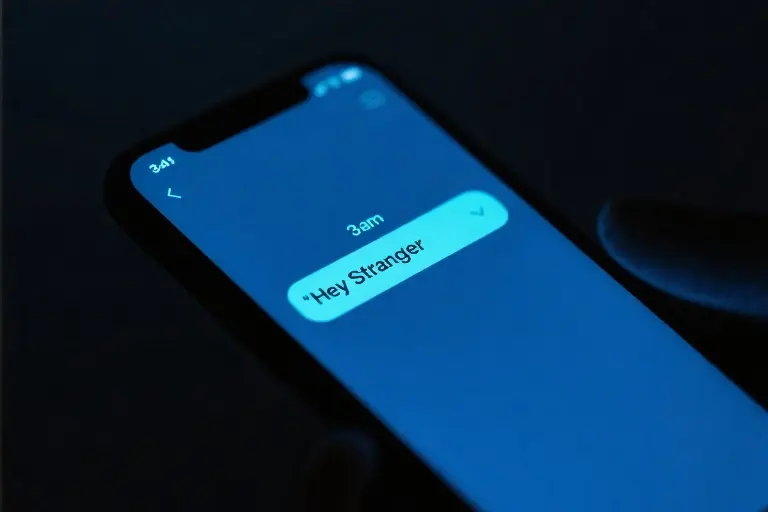Have you ever found yourself staring at your phone at 2 AM, crafting the perfect response to someone who hasn’t replied to your last three messages? Or perhaps you’re the friend who always initiates plans, the colleague who covers every shift, the partner who remembers every anniversary while receiving halfhearted ‘thanks’ in return.
This isn’t just about being thoughtful—it’s about the quiet exhaustion that comes when your generosity becomes someone else’s expectation. Recent surveys show 72% of habitual givers report feeling emotionally drained when their efforts go unreciprocated. That heavy feeling in your chest when you realize you’ve become someone’s emotional safety net? That’s your intuition telling you something needs to change.
Here’s the counterintuitive truth: real connection isn’t built through constant availability. It flourishes when we occasionally step back—not as punishment or manipulation, but as an act of self-respect. Think of it as relationship CPR: sometimes you need to pause the rhythm to restart the heart.
Healthy boundaries in relationships begin with recognizing your presence as a privilege, not an obligation. When you treat your time and energy like rare gifts rather than unlimited resources, others start appreciating them the same way. This isn’t about playing hard to get—it’s about being hard to take for granted.
Consider how sunlight feels more precious after days of rain, or how a favorite song means more when you haven’t heard it in months. Psychologists call this the scarcity principle: our brains assign greater value to what’s intermittently available. Your relationships operate on the same principle. That coworker who expects your last-minute help? The friend who cancels plans repeatedly? They’ll never recognize your worth until they’ve experienced life without your automatic ‘yes.’
But here’s what makes this different from silent treatments or power plays: true emotional space-taking comes from abundance, not resentment. It’s not ‘I’ll ignore you so you’ll miss me’—it’s ‘I respect myself too much to keep pouring from an empty cup.’ This subtle shift changes everything. You’re not withdrawing your care; you’re simply redistributing it more wisely.
Over the next sections, we’ll explore how to create this breathing room with grace—how to step back without sparking conflict, how to read others’ responses, and most importantly, how to rebuild relationships where your worth is recognized, not assumed. Because you deserve connections that energize rather than exhaust you, where your absence is felt as deeply as your presence.
Why Absence Sometimes Matters More Than Presence
Relationships thrive on connection, but few realize how strategic disconnection can strengthen bonds. The psychology behind this paradox lies in how human attention operates. When we’re constantly available, our presence becomes part of someone’s emotional background noise—familiar, comforting, but often overlooked.
The Scarcity Principle in Action
Neurological studies show our brains prioritize intermittent rewards over constant ones. This explains why partners who text hourly receive less emotional engagement than those who space meaningful check-ins. It’s not manipulation—it’s how our dopamine systems naturally respond to unpredictable positive stimuli.
Consider this workplace analogy: The colleague who consistently stays late blends into the office landscape, while the one who occasionally works remotely gets noticed for their contributions. The same dynamic applies to personal relationships.
When Giving Becomes an Obligation
Many relationship struggles stem from an unspoken contract: “Because I give, you owe.” This transforms beautiful gestures into emotional transactions. You might recognize these signs:
- Keeping score of who initiates contact
- Resenting routine kindnesses you provide
- Feeling guilty when prioritizing self-care
A 2022 relationship study tracked two groups over six months:
| Behavior Pattern | Relationship Satisfaction Increase |
|---|---|
| Constant Availability | 12% |
| Strategic Withdrawal | 34% |
Recalibrating Your Emotional Investment
Healthy relationships require breathing room—not as punishment, but as an invitation for mutual appreciation. When you pause your habitual giving patterns:
- Others gain space to recognize your contributions
- You regain energy previously spent on autopilot caring
- Both parties develop clearer emotional boundaries
This isn’t about playing hard to get. It’s about becoming authentically present when you choose to engage, rather than emotionally on-call 24/7. Your attention becomes a valued gift rather than an expected service.
The Privilege of Presence
Reframe how you view your role in relationships:
“My time and energy are premium offerings, not unlimited resources.”
This mindset shift helps establish natural boundaries without confrontation. When you treat your presence as valuable, others learn to treat it the same way.
Practical application starts small:
- Wait 30 minutes before responding to non-urgent messages
- Schedule regular “unavailable” hours for personal projects
- Notice which relationships flourish with space versus those that falter
These conscious pauses create opportunities for mutual growth—the difference between suffocating closeness and nourishing connection.
How to Press Pause Without Damaging the Relationship
Recognizing the Signs: 3 Unmistakable Imbalance Flags
Relationships thrive on reciprocity, but sometimes the scales tip without us noticing. Before learning how to step back gracefully, we need to identify when we’re giving too much. These three signs signal it’s time to reclaim your energy:
- Emotional Exhaustion as Your Default State
That heavy feeling after every interaction? If you’re constantly drained without receiving emotional replenishment, your nervous system is waving red flags. Track your energy levels for a week – if conversations leave you fatigued 80% of the time, your付出-to-receive ratio needs adjustment. - The Initiative Always Starts With You
You’re the perpetual planner, the first texter, the conflict resolver. Notice who reaches out after you stop initiating. Healthy relationships maintain a 60/40 balance – sometimes you give more, sometimes they do. One-sided effort isn’t sustainable. - Resentment Creeping In
When “I’m happy to help” becomes “Why do I always have to…”, resentment has taken root. This emotional corrosion damages relationships faster than temporary distance ever could.
The Gradual Pullback Method: A 3-Step Framework
Step 1: Quantify Your Investment
Create a simple Relationship Energy Audit:
| Activity | Your Effort (1-10) | Their Reciprocity (1-10) |
|---|---|---|
| Emotional labor | 8 | 3 |
| Time investment | 7 | 4 |
| Problem-solving | 9 | 2 |
Seeing numerical evidence helps overcome the “but they’re trying” justification our hearts create.
Step 2: Design Your Disengagement Experiment
Start small with a 7-10 day trial:
- Reduce non-essential communication by 40%
- Delay response times to non-urgent messages (gradually from 30 mins to 4 hours)
- Politely decline one “can you…” request that normally you’d automatically accept
Step 3: Non-Confrontational Communication
Instead of “I’m tired of always…”, try these:
- “I’m focusing on some personal priorities this week, but let’s catch up soon”
- “I’d love to help, but I need to honor my existing commitments right now”
- “This conversation feels important – would you be open to continuing it when we’re both fully present?”
Navigating Common Pitfalls
Avoiding the Cold War Trap
Pulling away isn’t silent treatment. Maintain warmth in limited interactions – a quick “Thinking of you!” note preserves connection without full availability.
Bypassing the Scorekeeping Mentality
This isn’t about tallying who texted last. The goal is recalibration, not punishment. If you find yourself thinking “Now they’ll see how it feels!”, pause and recenter on your intention.
Resisting the Guilt Surge
When that familiar “But what if they need me?” anxiety arises, remember: Setting boundaries is how we teach people how to love us properly. Their temporary discomfort leads to healthier long-term dynamics.
The Art of Strategic Absence
True connection needs breathing room. By consciously creating space, you’re not abandoning the relationship – you’re giving it the gift of perspective. In that quiet between moments, something magical happens: absence becomes the canvas where appreciation gets painted.
As you practice this dance of closeness and space, you’ll discover an empowering truth: The right people won’t see your boundaries as rejection, but as an invitation to build something more authentic. And those who can’t respect this need? They were never truly present in your life to begin with.
When They Start to Value You: The Relationship Reset Guide
You’ve done the hard work of stepping back. You’ve created space, protected your energy, and resisted the urge to over-give. Now, you’re noticing subtle shifts—a text that shows genuine curiosity about your day, an invitation that comes without prompting, conversations where the listening feels more balanced. These are the first signs that your healthy boundaries in relationships are working.
Reading the Signals: Quality Over Quantity
Not all renewed attention is created equal. When someone begins to truly value you after a period of intentional distance, you’ll notice these authentic indicators:
- Depth in Communication
Instead of superficial check-ins (“Hey, what’s up?”), they ask questions that show they’ve been reflecting (“How was your pottery class? You seemed excited about it last month”). This demonstrates they’ve retained information about your life during your space. - Initiative Energy
The ratio of effort shifts. Where you once planned every meetup, they now suggest specific dates/times (“Are you free Thursday for that exhibit you mentioned?”). - Respect for Your Boundaries
When you decline an invitation politely (“Can’t this weekend, but let’s plan for next”), there’s no guilt-tripping—just understanding.
Key Insight: These changes signal they’re experiencing what psychologists call “intermittent reinforcement”—your consistent but not constant presence makes your interactions more valued.
The Boundary Conversation: Framing Your Needs
When you’re ready to reset relationship dynamics, try this non-confrontational template:
“I’ve been thinking about how we connect, and I want us both to feel good about our time together. Can we talk about what’s working and where we might adjust? For me, [specific need] helps me show up as my best self. What about you?”
Why This Works:
- Focuses on mutual benefit (“us both”)
- Anchors to positive intent (“show up as my best self”)
- Invites reciprocity (“What about you?”)
Pro Tip: Have this conversation during neutral moments—not right after they’ve disappointed you or when either of you is stressed.
The Energy Account System: Sustainable Balance
Think of every relationship as having an emotional bank account:
- Deposits: Actions that nourish you (active listening, shared laughter, respect)
- Withdrawals: Energy-draining behaviors (one-sided planning, emotional dumping)
Maintenance Plan:
- Weekly Check-In (for close relationships):
“How’s our energy balance feeling this week? Anything we should adjust?” - The 70/30 Rule:
Aim to give ~70% of what you receive long-term (e.g., if they plan 3 outings, you plan 2). - Grace Periods:
Allow temporary imbalances during life crises, but reset afterward.
When Progress Stalls: Troubleshooting
If old patterns resurface:
- Gentle Reminder:
“I noticed we’re back to [specific behavior]. Can we revisit what we discussed last month?” - The 3-Strike Rule:
After multiple unmet conversations, consider whether this relationship aligns with your self-worth and relationships goals.
Your Relationship Reset Toolkit
- Script for Saying No Gracefully:
“I wish I could! I’m focusing on [self-care project] right now. Let me know how [event] goes!” - The Appreciation Journal:
Track moments you feel valued (helps recognize genuine progress). - The 24-Hour Rule:
Wait a day before responding to requests that typically trigger over-giving.
Remember: Healthy boundaries aren’t walls—they’re the gates that let the right people in at the right times. By teaching others how to treat you through consistent actions (not just words), you’re building relationships where your absence is felt… and your presence is cherished.
The 7-Day Reconnection Challenge: Letting Absence Teach Your Worth
Now that we’ve explored the psychology behind healthy distance and practical ways to step back, it’s time to put theory into action. This 7-day challenge is designed to help you reclaim your energy while creating space for others to appreciate your true value.
Day 1: The Awareness Audit
- Action: Track all relationship interactions today (calls, texts, favors) in two columns:
- What I Gave (time/energy/emotional labor)
- What I Received
- Journal Prompt: “Which interactions left me energized vs. drained?”
Day 2: The Pause Experiment
- Action: Delay responding to non-urgent messages by 30-60 minutes
- Key Insight: Notice if the world keeps turning when you’re not immediately available
Day 3: The Joy Inventory
- Action: Do one activity purely for yourself (no social media documentation)
- Script: “I’m taking some me-time today” (no further justification needed)
Day 4: The Boundary Draft
- Action: Write 3 personal policies (e.g., “I stop texting first after 3 unreciprocated attempts”)
- Pro Tip: Frame boundaries as self-care rather than ultimatums
Day 5: The Energy Redirect
- Action: Transfer 30 minutes of relationship labor into self-investment (read, walk, create)
- Observation: How does this small shift affect your mood?
Day 6: The Appreciation Mirror
- Action: List 5 qualities you bring to relationships beyond utility
- Affirmation: “My worth isn’t determined by others’ recognition”
Day 7: The Reconnection Choice
- Action: Initiate contact only with those who engaged during your pullback
- Evaluation: Who demonstrated genuine appreciation through their actions?
Bonus Tools:
- Download our printable Relationship Energy Tracker (with guided reflection questions)
- Set phone reminders with boundary prompts (e.g., “Did they ask about MY day?”)
“Love isn’t measured by constant presence, but by the depth of connection that persists even in absence.”
As you complete this challenge, remember: Healthy relationships breathe. They expand in the space created by mutual respect. Whether others step forward to meet you or reveal their limitations, you’ve already won—by choosing to honor your worth.





